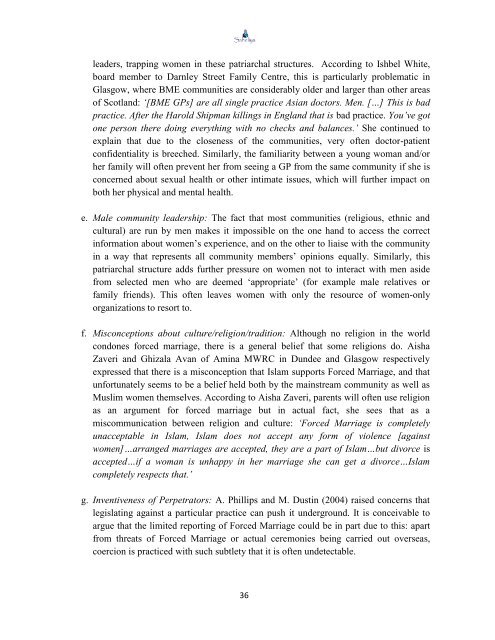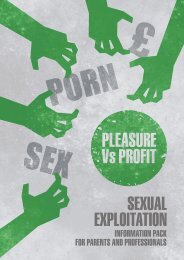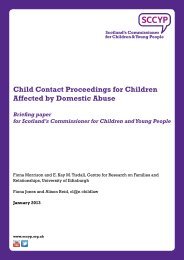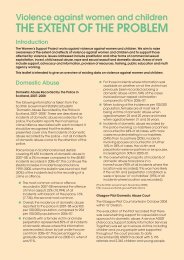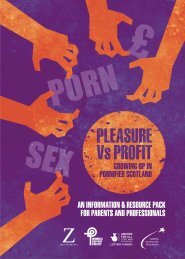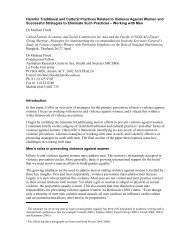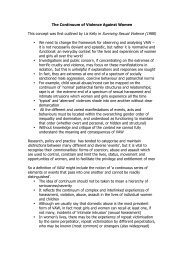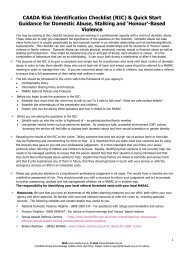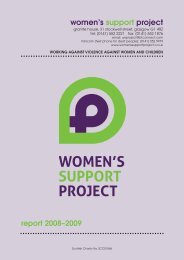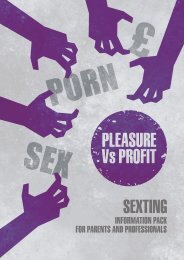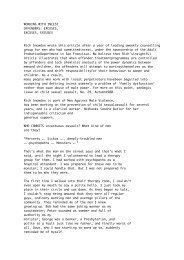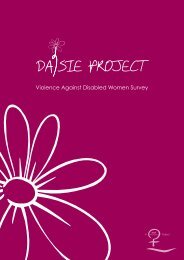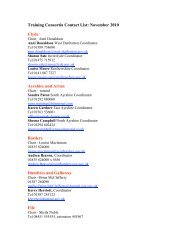WOMEN AND FORCED MARRIAGE IN SCOTLAND
women and forced marriage in scotland - Women's Support Project
women and forced marriage in scotland - Women's Support Project
- No tags were found...
Create successful ePaper yourself
Turn your PDF publications into a flip-book with our unique Google optimized e-Paper software.
leaders, trapping women in these patriarchal structures. According to Ishbel White,<br />
board member to Darnley Street Family Centre, this is particularly problematic in<br />
Glasgow, where BME communities are considerably older and larger than other areas<br />
of Scotland: ‘[BME GPs] are all single practice Asian doctors. Men. […] This is bad<br />
practice. After the Harold Shipman killings in England that is bad practice. You’ve got<br />
one person there doing everything with no checks and balances.’ She continued to<br />
explain that due to the closeness of the communities, very often doctor-patient<br />
confidentiality is breeched. Similarly, the familiarity between a young woman and/or<br />
her family will often prevent her from seeing a GP from the same community if she is<br />
concerned about sexual health or other intimate issues, which will further impact on<br />
both her physical and mental health.<br />
e. Male community leadership: The fact that most communities (religious, ethnic and<br />
cultural) are run by men makes it impossible on the one hand to access the correct<br />
information about women’s experience, and on the other to liaise with the community<br />
in a way that represents all community members’ opinions equally. Similarly, this<br />
patriarchal structure adds further pressure on women not to interact with men aside<br />
from selected men who are deemed ‘appropriate’ (for example male relatives or<br />
family friends). This often leaves women with only the resource of women-only<br />
organizations to resort to.<br />
f. Misconceptions about culture/religion/tradition: Although no religion in the world<br />
condones forced marriage, there is a general belief that some religions do. Aisha<br />
Zaveri and Ghizala Avan of Amina MWRC in Dundee and Glasgow respectively<br />
expressed that there is a misconception that Islam supports Forced Marriage, and that<br />
unfortunately seems to be a belief held both by the mainstream community as well as<br />
Muslim women themselves. According to Aisha Zaveri, parents will often use religion<br />
as an argument for forced marriage but in actual fact, she sees that as a<br />
miscommunication between religion and culture: ‘Forced Marriage is completely<br />
unacceptable in Islam, Islam does not accept any form of violence [against<br />
women]…arranged marriages are accepted, they are a part of Islam…but divorce is<br />
accepted…if a woman is unhappy in her marriage she can get a divorce…Islam<br />
completely respects that.’<br />
g. Inventiveness of Perpetrators: A. Phillips and M. Dustin (2004) raised concerns that<br />
legislating against a particular practice can push it underground. It is conceivable to<br />
argue that the limited reporting of Forced Marriage could be in part due to this: apart<br />
from threats of Forced Marriage or actual ceremonies being carried out overseas,<br />
coercion is practiced with such subtlety that it is often undetectable.<br />
36


